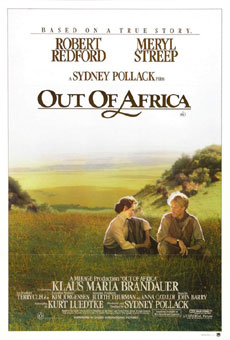In addition to Best Picture, Out of Africa won Best Art Direction-Set
Decoration, Best Cinematography, Best Director, Best Music, Original
Score, Best Sound, and Best Writing, Screenplay Based on Material from
Another Medium (Blixen's books, as well as Judith Thurman's Isak
Dinesen: The Life of a Storyteller and Errol Trzebinski's Silence
Will Speak).
The movie is told in flashback form, as Karen Blix (Streep), now an
old woman, reflects back on her time in Africa. A wealthy Danish woman,
she enters a marriage of convenience and purchases a plantation in Africa,
where she moves with her husband. There, they begin the painstaking
process of growing coffee, banking on future rewards.
Coping with such a big geographical and cultural change is difficult
for Karen, especially since her husband, Bror (Klaus Maria Brandauer,
whom James Bond fans will recognize as Maximilian Largo from Never
Say Never Again), is frequently absent. Fortunately, she meets dashing
aviator/hunter Denys Finch Hatton (Redford), who helps her to adjust.
The two become close, just as her marriage runs into troubles.
While this movie is a biographical picture, it is in many ways a better
epic romance than many fictional romances that have made it onto the
big screen. The film is played with a lyrical subtlety that avoids the
melodrama that pervades most romances. When dire circumstances befall
Karen, she does not react with histrionics. In typical Meryl Streep
fashion, you see Karen processing the news internally, then determining
what action to take. This has always been one of Streep's strengths.
As the central character of this film, Streep is compelling. She patterned
the accent on listening to actual recordings of Karen Blix (whose pen
name was Isak Dinesen) reading her work.
Just as compelling are the beautiful images of Africa, captured by
cinematographer David Watkin. The film is set in Kenya, and Denys tells
Karen that, as outsiders, they can't truly own the land. Instead, he
insists, it will eventually go back into the wild. He is a great advocate
of the preservation of both nature and the indigenous culture. Interestingly
enough, while the film was shot on location in the actual Ngong Hills
outside Nairobi in Kenya (where the movie is set), local laws prohibited
the use of wild animals in film, so trained lions were imported from
California. Actual descendants of the Kikuyu tribe who were described
in the book appeared in the film.
Redford does a great job as the adventurous yet sensitive Denys. For
his part, Brandauer plays Bror as vacillating between selfish and somewhat
callous to tender.
While this film keeps a leisurely pace, clocking in at 160 minutes
(2 hours and 40 minutes), the pacing is justified. The film never feels
like it's dragging. This is, in part, because Streep is such a joy to
watch, but it is also because the editing and cinematography, combined
with the musical score, work so well. This movie feels like a symphony,
where parts of the movie are loud and bombastic, while other parts are
as tender and lilting as a flute solo.
Out of Africa feels nostalgic, as someone might view a world
that had been precious at a key stage of life. This suits the fact that
the film is told through the memories of an elderly woman.
I had never seen this film, having assumed it would be overly sentimental
and perhaps even boring. I feared it would be like so many of the epics
that get Oscar noms: a bigger picture than it needed to be. Instead,
I was pleasantly surprised. Out of Africa is grand in the way
that Lawrence of Arabia is grand: by showing us a widescreen,
vivid backdrop against which historic figures come to life.
Rating: **** (4 out of 5 stars)


